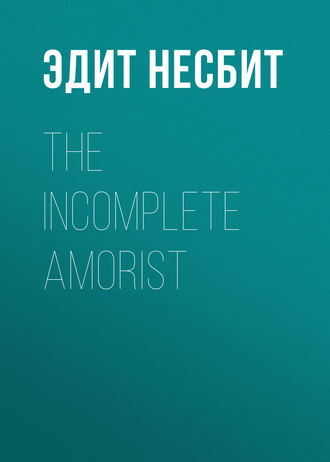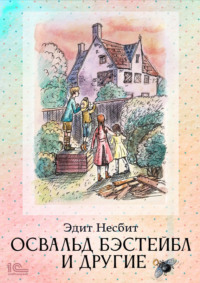 полная версия
полная версияThe Incomplete Amorist
It was Aunt Nina who taught Betty how to spend her allowance, how to buy pretty things, and, better still, tried to teach her how to wear them. Aunt Julia it was who brought her the Indian necklaces, and promised to take her to Italy some day if she was good. Aunt Nina lived in Grosvenor Square and Aunt Julia's address was most often, vaguely, the Continent of Europe. Sometimes a letter addressed to some odd place in Asia or America would find her.
But when Betty had left school her visits to Aunt Nina ceased. Mr. Underwood feared that she was now of an age to be influenced by trifles, and that London society would make her frivolous. Besides he had missed her horribly, all through her school-days, though he had yielded to the insistence of the aunts. But he had wanted Betty badly. Only of course it never occurred to him to tell her so.
So Betty had lived on at the Rectory carrying on, with more or less of success, such of her Mother's Parish workings as had managed to outlive their author, and writing to the aunts to tell them how bored she was and how she hated to be called "Lizzie."
She could not be expected to know that her stepfather had known as "Lizzie" the girl who, if Fate had been kind, would have been his wife or the mother of his child. Betty's letters breathed contempt of Parish matters, weariness of the dulness of the country, and exasperation at the hardness of a lot where "nothing ever happened."
Well, something had happened now.
The tremendous nature of the secret she was keeping against the world almost took Betty's breath away. It was to the adventure, far more than to the man, that her heart's beat quickened. Something had happened.
Long Barton was no longer the dullest place in the world. It was the centre of the universe. See her diary, an entry following a gap where a page had been torn out:
"Mr. V. is very kind. He is teaching me to sketch. He says I shall do very well when I have forgotten what I learned at school. It is so nice of him to be so straightforward. I hate flattery. He has begun my portrait. It is beautiful, but he says it is exactly like me. Of course it is his painting that makes it beautiful, and not anything to do with me. That is not flattery. I do not think he could say anything unless he really thought it. He is that sort of man, I think. I am so glad he is so good. If he were a different sort of person perhaps it would not be quite nice for me to go and meet him without any one knowing. But there is nothing of that sort. He was quite different the first day. But I think then he was off his guard and could not help himself. I don't know quite what I meant by that. But, anyway, I am sure he is as good as gold, and that is such a comfort. I revere him. I believe he is really noble and unselfish, and so few men are, alas!"
The noble and unselfish Vernon meanwhile was quite happy. His picture was going splendidly, and every morning he woke to the knowledge that his image filled all the thoughts of a good little girl with gray dark charming eyes and a face that reminded one of a pretty kitten. Her drawing was not half bad either. He was spared the mortifying labour of trying to make a silk purse out of a sow's ear. In one of his arts as in the other he decided that she had talent. And it was pleasant that to him should have fallen the task of teacher in both departments. Those who hunt the fox will tell you that Reynard enjoys, equally with the hounds and their masters, the pleasures of the chase. Vernon was quite of this opinion in regard to his favourite sport. He really felt that he gave as much pleasure as he took. And his own forgettings were so easy that the easy forgetting of others seemed a foregone conclusion. His forgetting always came first, that was all. But now, the Spring, her charm and his own firm parti pris working together, it seemed to him that he could never forget Betty, could never wish to forget her.
Her pretty conscious dignity charmed him. He stood still to look at it. He took no step forward. His role was that of the deeply respectful "brother artist." If his hand touched hers as he corrected her drawing, that was accident. If, as he leaned over her, criticising her work, the wind sent the end of her hair against his ear, that could hardly be avoided in a breezy English spring. It was not his fault that the little thrill it gave him was intensified a hundred-fold when, glancing at her, he perceived that her own ears had grown scarlet.
Betty went through her days in a dream. There were all the duties she hated—the Mothers' meetings, the Parish visits when she tried to adjust the quarrels and calm the jealousies of the stout aggressive Mothers, the carrying round the Parish Magazine. There were no long hours, now. In every spare moment she worked at her drawing to please him. It was the least she could do, after all his kindness.
Her step-father surprised her once hard at work with charcoal and board and plumb-line, a house-maid posing for her with a broom. He congratulated himself that his little sermon on the advantages of occupation as a cure for discontent had borne fruit so speedy and so sound.
"Dear child, she only wanted a word in season," he thought. And he said:
"I am glad to see that you have put away vain dreams, Lizzie. And your labours will not be thrown away, either. If you go on taking pains I daresay you will be able to paint some nice blotting-books and screens for the School Bazaar."
"I daresay," said Betty, adding between her teeth, "If you only knew!"
"But we mustn't keep Letitia from her work," he added, vaguely conscientious. Letitia flounced off, and Betty, his back turned, tore up the drawing.
And, as a beautiful background to the gross realism of Mothers' meetings and Parish tiresomenesses, was always the atmosphere of the golden mornings, the dew and the stillness, the gleam of his white coat among the pine-trees. For he was always first at the tryst now.
Betty was drunk; and she was too young to distinguish between vintages. When she had been sober she had feared intoxication. Now she was drunk, she thanked Heaven that she was sober.
CHAPTER IV.
INVOLUNTARY
Six days of sunlight and clear air, of mornings as enchanting as dreams, of dreams as full of magic as May mornings. Then an interminable Sunday hot and sultry, with rolling purple clouds and an evening of thunder and heavy showers. A magenta sunset, a night working, hidden in its own darkness, its own secret purposes, and a Monday morning gray beyond belief, with a soft steady rain.
Betty stood for full five minutes looking out at the straight fine fall, at the white mist spread on the lawn, the blue mist twined round the trees, listening to the plash of the drops that gathered and fell from the big wet ivy leaves, to the guggle of the water-spout, the hiss of smitten gravel.
"He'll never go," she thought, and her heart sank.
He, shaving, in the chill damp air by his open dimity-draped window, was saying:
"She'll be there, of course. Women are all perfectly insensible to weather."
Two mackintoshed figures met in the circle of pines.
"You have come," he said. "I never dreamed you would. How cold your hand is!"
He held it for a moment warmly clasped.
"I thought it might stop any minute," said Betty; "it seemed a pity to waste a morning."
"Yes," he said musingly, "it would be a pity to waste a morning. I would not waste one of these mornings for a kingdom."
Betty fumbled with her sketching things as a sort of guarantee of good faith.
"But it's too wet to work," said she. "I suppose I'd better go home again."
"That seems a dull idea—for me," he said; "it's very selfish, of course, but I'm rather sad this morning. Won't you stay a little and cheer me up?"
Betty asked nothing better. But even to her a tete-a-tete in a wood, with rain pattering and splashing on leaves and path and resonant mackintoshes, seemed to demand some excuse.
"I should think breakfast and being dry would cheer you up better than anything," said she. "And it's very wet here."
"Hang breakfast! But you're right about the wetness. There's a shed in the field yonder. A harrow and a plough live there; they're sure to be at home on a day like this. Let's go and ask for their hospitality."
"I hope they'll be nice to us," laughed Betty; "it's dreadful to go where you're not wanted."
"How do you know?" he asked, laughing too. "Come, give me your hand and let's run for it."
They ran, hand in hand, the wet mackintoshes flapping and slapping about their knees, and drew up laughing and breathless in the dry quiet of the shed. Vernon thought of Love and Mr. Lewisham, but it was not the moment to say so.
"See, they are quite pleased to see us," said he, "they don't say a word against our sheltering here. The plough looks a bit glum, but she'll grow to like us presently. As for harrow, look how he's smiling welcome at you with all his teeth."
"I'm glad he can't come forward to welcome us," said Betty. "His teeth look very fierce."
"He could, of course, only he's enchanted. He used to be able to move about, but now he's condemned to sit still and only smile till—till he sees two perfectly happy people. Are you perfectly happy?" he asked anxiously.
"I don't know," said Betty truly. "Are you?"
"No—not quite perfectly."
"I'm so glad," said Betty. "I shouldn't like the harrow to begin to move while we're here. I'm sure it would bite us."
He sighed and looked grave. "So you don't want me to be perfectly happy?"
She looked at him with her head on one side.
"Not here," she said. "I can't trust that harrow."
His eyelids narrowed over his eyes—then relaxed. No, she was merely playing at enchanted harrows.
"Are you cold still?" he asked, and reached for her hand. She gave it frankly.
"Not a bit," she said, and took it away again. "The run warmed me. In fact—"
She unbuttoned the mackintosh and spread it on the bar of the plough and sat down. Her white dress lighted up the shadows of the shed. Outside the rain fell steadily.
"May I sit down too? Can Mrs. Plough find room for two children on her lap?"
She drew aside the folds of her dress, but even then only a little space was left. The plough had been carelessly housed and nearly half of it was where the rain drove in on it. So that they were very close together.
So close that he had to throw his head back to see clearly how the rain had made the short hair curl round her forehead and ears, and how fresh were the tints of face and lips. Also he had to support himself by an arm stretched out behind her. His arm was not round her, but it might just as well have been, as far as the look of the thing went. He thought of the arm of Mr. Lewisham.
"Did you ever have your fortune told?" he asked.
"No, never. I've always wanted to, but Father hates gipsies. When I was a little girl I used to put on my best clothes, and go out into the lanes and sit about and hope the gipsies would steal me, but they never did."
"They're a degenerate race, blind to their own interests. But they haven't a monopoly of chances—fortunately." His eyes were on her face.
"I never had my fortune told," said Betty. "I'd love it, but I think I should be afraid, all the same. Something might come true."
Vernon was more surprised than he had ever been in his life at the sudden involuntary movement in his right arm. It cost him a conscious effort not to let the arm follow its inclination and fall across her slender shoulders, while he should say:
"Your fortune is that I love you. Is it good or bad fortune?"
He braced the muscles of his arm, and kept it where it was. That sudden unreasonable impulse was a mortification, an insult to the man whose pride it was to believe that his impulses were always planned.
"I can tell fortunes," he said. "When I was a boy I spent a couple of months with some gipsies. They taught me lots of things."
His memory, excellently trained, did not allow itself to dwell for an instant on his reason for following those gipsies, on the dark-eyed black-haired girl with the skin like pale amber, who had taught him, by the flicker of the camp-fire, the lines of head and heart and life, and other things beside. Oh, but many other things! That was before he became an artist. He was only an amateur in those days.
"Did they teach you how to tell fortunes—really and truly?" asked Betty. "We had a fortune-teller's tent at the School Bazaar last year, and the youngest Smithson girl dressed up in spangles and a red dress and said she was Zara, the Eastern Mystic Hand-Reader, and Foreteller of the Future. But she got it all out of Napoleon's Book of Fate."
"I don't get my fortune-telling out of anybody's book of anything," he said. "I get it out of people's hands, and their faces. Some people's faces are their fortunes, you know."
"I know they are," she said a little sadly, "but everybody's got a hand and a fortune, whether they've got that sort of fortune-face or not."
"But the fortunes of the fortune-faced people are the ones one likes best to tell."
"Of course," she admitted wistfully, "but what's going to happen to you is just as interesting to you, even if your face isn't interesting to anybody. Do you always tell fortunes quite truly; I mean do you follow the real rules? or do you make up pretty fortunes for the people with the pretty fortune-faces."
"There's no need to 'make up.' The pretty fortunes are always there for the pretty fortune-faces: unless of course the hand contradicts the face."
"But can it?"
"Can't it? There may be a face that all the beautiful things in the world are promised to: just by being so beautiful itself it draws beautiful happenings to it. But if the hand contradicts the face, if the hand is one of those narrow niggardly distrustful hands, one of the hands that will give nothing and take nothing, a hand without courage, without generosity—well then one might as well be born without a fortune-face, for any good it will ever do one."
"Then you don't care to tell fortunes for people who haven't fortune faces?"
"I should like to tell yours, if you would let me. Shall I?"
He held out his hand, but her hand was withheld.
"I ought to cross your hand with silver, oughtn't I?" she asked.
"It's considered correct—but—"
"Oh, don't let's neglect any proper precaution," she said. "I haven't got any money. Tell it me to-morrow, and I will bring a sixpence."
"You could cross my hand with your watch," he said, "and I could take the crossing as an I.O.U. of the sixpence."
She detached the old watch. He held out his hand and she gravely traced a cross on it.
"Now," he said, "all preliminary formalities being complied with, let the prophet do his work. Give me your hand, pretty lady, and the old gipsy will tell you your fortune true."
He held the hand in his, bending back the pink finger-tips with his thumb, and looked earnestly at its lines. Then he looked in her face, longer than he had ever permitted himself to look. He looked till her eyes fell. It was a charming picture. He was tall, strong, well-built and quite as good-looking as a clever man has any need to be. And she was as pretty as any oleograph of them all.
It seemed a thousand pities that there should be no witness to such a well-posed tableau, no audience to such a charming scene. The pity of it struck Destiny, and Destiny flashed the white of Betty's dress, a shrill point of light, into an eye a hundred yards away. The eye's owner, with true rustic finesse, drew back into the wood's shadow, shaded one eye with a brown rustic hand, looked again, and began a detour which landed the rustic boots, all silently, behind the shed, at a spot where a knot-hole served as frame for the little picture. The rustic eye was fitted to the knot-hole while Vernon holding Betty's hand gazed in Betty's face, and decided that this was no time to analyse his sensations.
Neither heard the furtive rustic tread, or noted the gleam of the pale rustic eye.
The labourer shook his head as he hurried quickly away. He had daughters of his own, and the Rector had been kind when one of those daughters had suddenly come home from service, ill, and with no prospect of another place.
"A-holdin' of hands and a-castin' of sheep's eyes," said he. "We knows what that's the beginnings of! Well, well, youth's the season for silliness, but there's bounds—there's bounds. And all of a mornin' so early too. Lord above knows what it wouldn't be like of a evenin'." He shook his head again, and made haste.
Vernon had forced his eyes to leave the face of Betty.
"Your fortune," he was saying, "is, curiously enough, just one of those fortunes I was speaking of. You will have great chances of happiness, if you have the courage to take them. You will cross the sea. You've never travelled, have you?"
"No,—never further than Torquay; I was at school there, you know; and London, of course. But I should love it. Isn't it horrid to think that one might grow quite old and never have been anywhere or done anything?"
"That depends on oneself, doesn't it? Adventures are to the adventurous."
"Yes, that's all very well—girls can't be adventurous."
"Yes,—it's the Prince who sets out to seek his fortune, isn't it? The Princess has to sit at home and wait for hers to come to her. It generally does if she's a real Princess."
"But half the fun must be the seeking for it," said Betty.
"You're right," said he, "it is."
The labourer had reached the park-gate. His pace had quickened to the quickening remembrance of his own daughter, sitting at home silent and sullen.
"Do you really see it in my hand?" asked Betty,—"about my crossing the sea, I mean."
"It's there; but it depends on yourself, like everything else."
"I did ask my step-father to let me go," she said, "after that first day, you know, when you said I ought to study in Paris."
"And he wouldn't, of course?"
"No; he said Paris was a wicked place. It isn't really, is it?"
"Every place is wicked," said he, "and every place is good. It's all as one takes things."
The Rectory gate clicked sharply as it swung to behind the labourer. The Rectory gravel scrunched beneath the labourer's boots.
Yes, the Master was up; he could be seen.
The heavy boots were being rubbed against the birch broom that, rooted at Kentish back doors, stands to receive on its purple twigs the scrapings of Kentish clay from rustic feet.
"You have the artistic lines very strongly marked," Vernon was saying. "One, two, three—yes, painting—music perhaps?"
"I am very fond of music," said Betty, thinking of the hour's daily struggle with the Mikado and the Moonlight Sonata. "But three arts. What could the third one be?" Her thoughts played for an instant with unheard-of triumphs achieved behind footlights—rapturous applause, showers of bouquets.
"Whatever it is, you've enormous talent for it," he said; "you'll find out what it is in good time. Perhaps it'll be something much more important than the other two put together, and perhaps you've got even more talent for it than you have for others."
"But there isn't any other talent that I can think of."
"I can think of a few. There's the stage,—but it's not that, I fancy, or not exactly that. There's literature—confess now, don't you write poetry sometimes when you're all alone at night? Then there's the art of being amusing, and the art of being—of being liked."
"Shall I be successful in any of the arts?"
"In one, certainly."
"Ah," said Betty, "if I could only go to Paris!"
"It's not always necessary to go to Paris for success in one's art," he said.
"But I want to go. I'm sure I could do better there."
"Aren't you satisfied with your present Master?"
"Oh!"—It was a cry of genuine distress, of heartfelt disclaim. "You know I didn't mean that! But you won't always be here, and when you've gone—why then—"
Again he had to control the involuntary movement of his left arm.
"But I'm not going for months yet. Don't let us cross a bridge till we come to it. Your head-line promises all sorts of wonderful things. And your heart-line—" he turned her hand more fully to the light.
In the Rector's study the labourer was speaking, standing shufflingly on the margin of the Turkey carpet. The Rector listened, his hand on an open folio where fat infants peered through the ornamental initials.
"And so I come straight up to you, Sir, me being a father and you the same, Sir, for all the difference betwixt our ways in life. Says I to myself, says I, and bitter hard I feels it too, I says: 'George,' says I, 'you've got a daughter as begun that way, not a doubt of it—holdin' of hands and sittin' close alongside, and you know what's come to her!'"
The Rector shivered at the implication.
"Then I says, says I: 'Like as not the Rector won't thank you for interferin'. Least said soonest mended,' says I."
"I'm very much obliged to you," said the Rector difficultly, and his hand shook on Ambrosius's yellow page.
"You see, Sir," the man's tone held all that deferent apology that truth telling demands, "gells is gells, be they never so up in the world, all the world over, bless their hearts; and young men is young men, d—n them, asking your pardon, Sir, I'm sure, but the word slipped out. And I shouldn't ha' been easy if anything had have gone wrong with Miss, God bless her, all along of the want of a word in season. Asking your pardon, Sir, but even young ladies is flesh and blood, when it comes to the point. Ain't they now?" he ended appealingly.
The Rector spoke with an obvious effort, got his hand off the page and closed the folio.
"You've done quite right, George," he said, "and I'm greatly obliged to you. Only I do ask you to keep this to yourself. You wouldn't have liked it if people had heard a thing like that about your Ruby before—I mean when she was at home."
He replaced the two folios on the shelf.
"Not me, Sir," George answered. "I'm mum, I do assure you, Sir. And if I might make so bold, you just pop on your hat and step acrost directly minute. There's that little hole back of the shed what I told you of. You ain't only got to pop your reverend eye to that there, and you'll see for yourself as I ain't give tongue for no dragged scent."
"Thank you, George," said the Rector, "I will. Good morning. God bless you."
The formula came glibly, but it was from the lips only that it came.
Lizzie—his white innocent Lily-girl! In a shed—a man, a stranger, holding her hand, his arm around her, his eyes—his lips perhaps, daring—
The Rector was half way down his garden drive.
"Your heart-line," Vernon was saying, "it's a little difficult. You will be deeply beloved."
To have one's fortune told is disquieting. To keep silence during the telling deepens the disquiet curiously. It seemed good to Betty to laugh.
"Soldier, sailor, tinker, tailor," she said, "which am I going to marry, kind gipsy?"
"I don't believe the gipsies who say they can see marriage in a hand," he answered gravely, and Betty feared he had thought her flippant, or even vulgar; "what one sees are not the shadows of coming conventions. One sees the great emotional events, the things that change and mould and develop character. Yes, you will be greatly beloved, and you will love deeply."
"I'm not to be happy in my affairs of the heart then." Still a careful flippancy seemed best to Betty.
"Did I say so? Do you really think that there are no happy love affairs but those that end in a wedding breakfast and bridesmaids, with a Bazaar show of hideous silver and still more hideous crockery, and all one's relations assembled to dissect one's most sacred secrets?"
Betty had thought so, but it seemed coarse to own it.
"Can't you imagine," he went on dreamily, "a love affair so perfect that it could not but lose its finest fragrance if the world were called to watch the plucking of love's flower? Can't you imagine a love so great, so deep, so tender, so absolutely possessing the whole life of the lover that he would almost grudge any manifestation of it? Because such a manifestation must necessarily be a repetition of some of the ways in which unworthy loves have been manifested, by less happy lovers? I can seem to see that one might love the one love of a life-time, and be content to hold the treasure in one's heart, a treasure such as no other man ever had, and grudge even a word or a look that might make it less the single perfect rose of the world."











